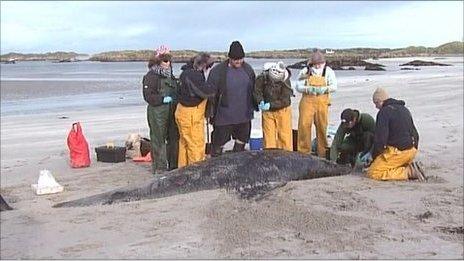Whale and dolphin strandings 'increase by 25%'
- Published

Scientists examine the remains of the whales on Rutland Island
Whale and dolphin strandings are increasing according to data to be released this week by the UK Cetacean Strandings Investigation Programme (CSIP).
The news comes in the wake of the unexplained mass beaching of 33 pilot whales found dead on Rutland Island off the coast of County Donegal earlier this month.
CSIP's data shows there has been a 25% increase in reported strandings since it began keeping records 20 years ago.
At least 500 dolphins, porpoises and whales have been found stranded on British beaches so far this year.
So is the increase in stranding numbers a sign that something disturbing is happening to these sea-going mammals?
Ian Enlander director of the Irish Whale and Dolphin Research Group (IWDG) said it was a difficult question to answer.
"It may be a sign that awareness of strandings is increasing or perhaps something else is going on. There are sometimes clusters of these events which may be caused by strong weather systems pushing already dead or dying animals towards the shore.
Haemorrhaging
The Donegal strandings have been connected to sonar technology used by the Royal Navy.
Sonar equipment has been the focus of investigations into whale and dolphin strandings for more than 10 years.
It is thought that the artificial sonar may interfere with the natural sonar sense of the animals causing them to be disoriented.
Sonar may also cause sudden pressure changes inside the animals' bodies leading to internal haemorrhaging.
Among the most notable incidents involving sonar was the stranding of a large number of beaked whales on beaches in the Canaries following Nato naval exercises in 2002.
And the US navy was accused of culpability in the deaths of 17 beaked whales which died in the Bahamas following a sonar exercise.
Mr Enlander said that while the relationship between sonar equipment used by navies around the world and cetacean deaths, in the case of the Rutland Island beachings it was hard to prove any link.
CSIP coordinates the investigation of all whale, dolphin and porpoise (collectively known as cetaceans), marine turtle and basking shark strandings around the UK coastline.
More than 9,000 incidents have been investigated and 2,500 post-mortems have been carried out by researchers during 20 years of the Defra-funded CSIP coordinated by the Zoological Society of London (ZSL).
Now CSIP marine scientists are calling on the public to be their eyes and ears along the UK coastline and report any stranded animals.
'Life-saving'
Emear McGee "they're a very strong and social group... so the sick and the healthy then died here together"
Rob Deaville, CSIP coordinator from ZSL, said that reports from the public play a crucial role in making the organisations aware of stranded animals.
"These reports can sometimes prove to be life-saving, but ultimately they all make a valuable contribution to the long-term conservation of cetaceans," he said.
The whale which died while being rescued from the River Thames in 2006 and the mass stranding of common dolphins in Cornwall in 2008 are just two of the high profile cases that the CSIP have investigated during the 20 years that the programme has run.
Dr Paul Jepson, wildlife veterinarian at ZSL, said the work of CSIP and ZSL has allowed scientists to build up a picture of how human activities affect marine life.
"This had led to changes in policy and best practice around fishing activities, chemical pollutants and military operations. We now need to continue this research to ensure we minimise these impacts in the future," he said.
Marine scientists will meet to review 20 years of data at the CSIP 20th Anniversary Symposium on 25 November at the Zoological Society of London's (ZSL) London Zoo.
The IWDG provides a practical guide to helping beached whales or dolphins on their website, external.
Strandings in Northern Ireland should be reported to the wildlife officer at Quoile Countryside Centre, external or to the Northern Ireland Environment Agency, external.
- Published16 November 2010